Richard Cordray, the chief operating officer of Federal Student Aid, is leaving the agency after facing calls from Congressional Republicans to resign over the botched roll-out of the Free Application for Federal Student Aid.
Cordray will lead the agency through the end of June, “in order to oversee the completion of key priorities within the organization,” the Education Department said in a news release late Friday morning. Education Secretary Miguel Cardona praised Cordray’s leadership of the agency as “consequential.”
Friday’s announcement comes as the department works to fix a variety of issues with the new FAFSA and grapples with the fallout. Cordray’s departure will also add to the leadership churn at Federal Student Aid, an agency within the department that manages the FAFSA and student loan programs. Cordray is the third person in seven years to serve as chief operating officer of Federal Student Aid, an ostensibly nonpolitical job that’s become increasingly politicized in recent years with leadership of the agency changing with each new presidential administration.
“Over my tenure, we provided student loan forgiveness to more than 4,000,000 borrowers and their families; made it easier for people to apply for and manage federal student aid; and took strong actions to hold schools accountable for defrauding students,” Cordray said in a statement. “I have agreed to stay on for an interim period to help with the transition.”
Cordray’s three-year appointment ends in early May, and he decided not to continue for another term, according to a department official.
A former Ohio attorney general and former director of the Consumer Financial Protection Bureau, Cordray took over the Office of Federal Student Aid in May 2021. As chief operating officer, he oversaw the restart of student loan payments, the Biden administration’s debt relief efforts and other projects. As the scale of the FAFSA fiasco became clear, Congressional Republicans laid the blame at his feet and called for his ouster.
“It’s time for Cordray to go and for the department to wake up and realize that blindly following Biden’s agenda is irreparably damaging student success,” Representative Virginia Foxx, the North Carolina Republican who chairs the House Committee on Education and the Workforce, said earlier this month.
The Education Department said earlier this month that it was not the time to point fingers.
Cardona said in a statement that he was grateful for Cordray’s three years of service, “in which he accomplished more transformational changes to the student aid system than any of his predecessors.” The statement specifically highlighted changes to fix the Public Service Loan Forgiveness as well as income-driven repayment programs. Cardona noted that Cordray also revitalized the FSA Enforcement Unit.
“It’s no exaggeration to say that Rich helped change millions of lives for the better,” Cardona said.
One project left off the list of Cordray's accomplishments? FAFSA.
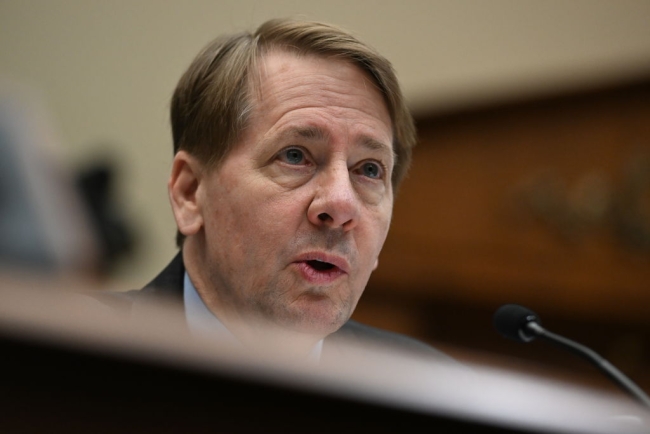
Richard Cordray has led the Office of Federal Student Aid since May 2021. His three-year appointment is up next week.
Photo by Ricky Carioti/The Washington Post via Getty Images
Richard Cordray has been the target of much Republican criticism and faced calls to resign over the bungled launch of the new FAFSA.
In November, Iowa’s Board of Regents adopted a broad diversity, equity and inclusion ban across its public universities: the University of Iowa, Iowa State University and the University of Northern Iowa.
The board’s first directive was sweeping: “Restructure the central, university-wide DEI offices to eliminate any DEI functions that are not necessary for compliance or accreditation.”
The orders didn’t stop there. Universities should “Review all college, department or unit-level DEI positions to determine whether DEI-specific job responsibilities are necessary for compliance, accreditation or student and employee support,” the board directed. It said any jobs “not necessary for these purposes shall be adjusted or eliminated.”
Iowa’s universities, and the board itself, are currently working to implement the directives. (Iowa State University, for instance, told the board Thursday that it will close its vice president for diversity, equity and inclusion’s office in July, while the University of Iowa said its position reviews will be done by the end of 2024.)
But the regents’ action didn’t go far enough for Republicans in the Iowa General Assembly. On April 9, they introduced an education-funding bill. Within 10 days, they had added anti-DEI provisions and passed the bill along to the Republican governor, Kim Reynolds, the day before this year’s legislative session ended. Her office didn’t respond to a request for comment from Inside Higher Ed on whether she plans to sign or veto the measure; Reynolds has 30 days from the April 20 adjournment to decide.
Adam Zabner, a Democratic state representative, said that while an extensive anti-DEI bill failed in the state Senate after passing the House earlier in the session, the anti-DEI provisions have now found their way into what “should be a routine budget bill.” Jeremy C. Young, director of the Freedom to Learn program at PEN America, a free expression group that opposes DEI bans, said the provisions were slipped “into the budget at the last minute.” Republican lawmakers didn’t respond to Inside Higher Ed's requests for comment Thursday.
If signed into law, Senate File 2435 would ban Iowa’s public universities from having DEI offices or from hiring or assigning anyone “to perform duties” of a DEI office. The ban would be sweeping because of how the bill defines DEI offices and DEI itself; it goes beyond the directives of the Board of Regents, which had left the definition of DEI open to interpretation.
In the legislation, DEI offices are any university unit responsible for “promoting … activities or procedures related to” DEI, and DEI encompasses any “activities designed or implemented with reference to race, color, ethnicity, gender identity or sexual orientation.” Unlike in some other states’ anti-DEI laws, these broad definitions would restrict programming beyond the university’s central DEI office, and would restrict programming that only references identities such as race and gender.
The regents’ directives had left room for DEI to continue—to some extent—outside of universities’ central DEI offices.
The bill also includes a version of what’s known as an institutional neutrality requirement. The war in Gaza revved up a pre-existing debate about whether university administrations—or subsets, such as academic departments—should take public stands on controversial political issues. But Senate File 2435 would require Iowa’s public universities to stay neutral on a potpourri of ideas or phrases that conservatives have contested.
It would forbid “any effort to promote,” as a public university’s official position, “a particular, widely contested opinion referencing unconscious or implicit bias, cultural appropriation, allyship, transgender ideology, microaggressions, group marginalization, antiracism, systemic oppression, social justice, intersectionality, neo-pronouns, heteronormativity, disparate impact, gender theory, racial privilege, sexual privilege, or any related formulation of these concepts.”
“This could, in a maximal interpretation, ban the university from stating any idea," Young said. In his view, the bill contains “the most vague, most overreaching version possible of a neutrality requirement around DEI-related concepts,” he said.
Young said Iowa legislators “are passing language that is so breathtakingly broad” that it risks “banning any program,” subject only to the state’s enforcement decisions. Young did, however, say the bill would “not have direct effects on faculty or student speech,” unlike new laws in Alabama and Indiana.
Alongside exemptions for complying with federal and accreditation requirements, the bill includes carve-outs saying its ban on DEI offices and functions wouldn’t impact academic departments that exist primarily for offering courses for credit. Registered student organizations would also be exempt.
Tyler Coward, lead counsel for government affairs at the Foundation for Individual Rights and Expression (FIRE), another free speech group, said the bill doesn’t cross “FIRE’s bright line” of restricting students’ and faculty members’ free speech or academic freedom. Coward said he reads the bill as circumscribing the official policies and procedures “of the institution itself,” not the faculty members or students within it.
“FIRE does recognize that DEI offices have been responsible for enforcing campus orthodoxy on certain issues” and for “investigating and punishing protected expression on campus,” Coward said. He also said “we’re generally skeptical of administrative bloat at institutions—administrative bloat, writ large, has a negative effect on free expression.”
Young, however, said it “defies belief” that the legislature could “pass this kind of extreme censorship” on institutional leaders and staff without affecting faculty and students downstream. University administrations ultimately uphold academic freedom, he said, and “what is done in this bill, it will take away the support structure that makes academic freedom possible.”
A spokesperson for the University of Iowa wrote in an email that the “university does not comment on proposed or recently adopted legislation, not yet signed into law.” Iowa State University did not respond to a request for comment, referring Inside Higher Ed to the board's spokesperson.
Zabner said his district includes most of the University of Iowa. “Even when there are exceptions in the letter of the law, you’re putting a lot of pressure on teachers, and imagine you’re a teacher or professor and you’re worried you could be sued."
“This type of policy does not belong in a budget bill,” Zabner said. He thinks lawmakers should have focused on freezing tuition for students rather than “some national culture war." As for the bill, he said “just the coverage and the conversation will create a chilling effect, and that’s a shame.”
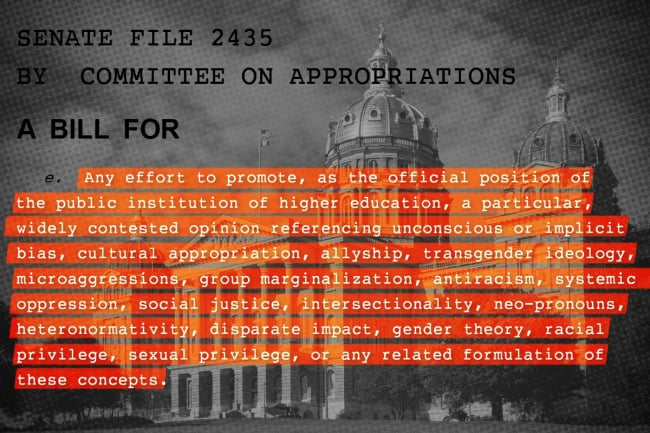
Senate File 2435 is awaiting Iowa Republican governor Kim Reynolds's signature or veto.
Photo illustration by Justin Morrison/Inside Higher Ed | Carol M. Highsmith/Library of Congress | Iowa Legislature
The Republican-controlled Iowa General Assembly ratcheted up restrictions issued by the state Board of Regents, sending the governor one of the nation’s broadest DEI bans.
At Emory University in Atlanta on Thursday, police tased pro-Palestinian protesters and targeted them with rubber bullets. A clash between Boston law enforcement and Emerson College students turned so violent that city sanitation workers were spotted cleaning blood from the cobblestone of a campus alleyway. In Austin, dozens of students and faculty rallied to protest what they saw as an excessive use of force Wednesday after officers clad in riot gear—and brandishing shields, batons and some assault rifles—descended on the University of Texas flagship campus and arrested more than 50 protesters.
The increasingly heavy use of force by local and state police officers trying to contain pro-Palestinian demonstrations is raising alarm among student protesters as well as First Amendment advocates, historians and others who have studied the impact of policing on college campuses over the decades.
“The large-scale deployment of armed officers to suppress peaceful protest on college campuses around the country is a shocking development,” the Knight First Amendment Institute said in a statement Thursday. “This response to peaceful protest is an assault on free speech—and it is also deeply reckless.”
The crackdown, which comes after months of protests, has escalated swiftly in recent days as colleges grapple with a fresh wave of unrest after police arrested more than 100 Columbia University students who had pitched tents on a campus lawn. Since the start of the Israel-Hamas war in early October, students have faced suspensions and arrests in connection with the protests. But as the academic year winds down, administrators on some campuses are adopting a harder line, increasingly turning to outside police forces to quell the demonstrations.
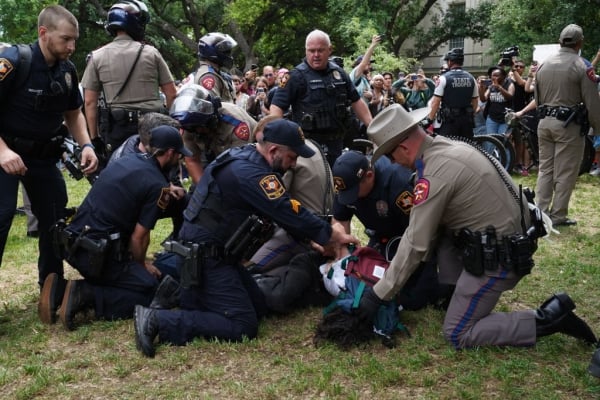
Photo by SUZANNE CORDEIRO/AFP via Getty Images
Some Republicans in Congress, including House Speaker Mike Johnson, have said local and state law enforcement need more help. They urged President Biden to send in the National Guard to protect Jewish students, who have felt threatened by antisemitic rhetoric and violence. Still, sending in the National Guard is a big step that some experts say would represent a dramatic escalation and could lead to violence.
“I don’t think anything good happens with bringing in militarized troops from the outside onto a campus,” said Kevin Kruse, a professor of history at Princeton University. “It doesn’t improve anything. We might get lucky and nothing happens. But we’re setting up conditions for possibly another Kent State.”
Another Day of Crackdowns
Peaceful protests on the Emory University quadrangle Thursday quickly escalated to violent clashes with the Atlanta Police Department and state troopers, who threw tear gas canisters and punctuated the air with the sound of rubber bullets.
Videos posted by local media and public observers show officers tackling protesters, zip-tying their hands behind their backs and loading them into vans. The police department declined to say how many people they arrested, referring all questions to Emory officials, who said “several dozen people” were taken into custody.
A university spokesperson initially denied that the protesters were affiliated with the university, calling them “activists attempting to disrupt our university as our students finish classes and prepare for finals.”
However, students and faculty members have been clearly identified among those arrested. A video provided to Atlanta News First by a Ph.D. student shows Noelle McAfee, chair of the university philosophy department, being escorted off campus. The spokesperson acknowledged this later in the day, changing the statement to say, “The activists who initially gathered were not recognized as members of our community.”
PT (2) 🚨 HAPPENING NOW AT EMORY: Tasers, Tear Gas, Rubber Bullets—Arrests.
— Shirion Collective (@ShirionOrg) April 25, 2024
⚠️ The footage is pretty intense.
📰 Today’s eruption at Emory University saw police clashing with violent Marxists, whose disruptive protest spiraled into anarchy.
👉👉 Follow @ShirionOrg for… pic.twitter.com/olazmanDbf
A group of Democratic state lawmakers condemned the use of “excessive force” on Emory’s campus, blaming the state’s Republican majority, who they said have created an environment where “state police feel free or perhaps are directed—to respond to normal peaceful protests with violence.”
In Boston, blood was visible in an Emerson College alleyway Thursday morning, evidence of the conflict that had unfurled late the previous night.
Videos and local reporting show students camped along a cobblestone street bracing for impact as they attempted to form a barricade to block police from entering the alley. Standing in rows with their arms locked, they held umbrellas in front of themselves as makeshift shield. But dozens of city police dressed in helmets and reflective jackets approached en masse, holding long sticks. They pulled protesters away from the line and dragged them along the ground.
Multiple students provided GBH News, a public radio station, with photos of injuries they sustained during the sweep. Four police officers also sustained non–life-threatening injuries—three minor and one serious—according to a police spokesman.
Students say protesters were "dragged to the ground" by police as officers cleared a pro-Palestinian encampment at Emerson College. More details: https://t.co/Ql6jYXJq1s pic.twitter.com/gAMWTMfEtL
— WCVB-TV Boston (@WCVB) April 25, 2024
Spread over a block in the heart of downtown Boston, Emerson’s campus makes it difficult for officials to draw lines between where the college ends and the city begins.
Mayor Michelle Wu told WCVB, a local TV station, that she reviewed bodycam footage and supports her officers’ actions. She added that even in a city known for its long history of revolutionary protests starting with the country’s founding fathers, officials must prioritize the safety and well-being of all residents.
“We have to be a city where everybody is safe,” Wu said. “That is my primary mission. I know that events happening around the world are incredibly painful. We have to be a community where everybody can express their views safely.”
The Threat of the National Guard
Although no one had been seriously hurt or killed in the clashes, some observers worry that the tactics police have demonstrated so far, combined with the threat of the National Guard intervening, could be a recipe for disaster.
“These moments call for calm and de-escalation and we’ve got a set of politicians who seem determined to sort of speed run to disaster,” said Kruse, the Princeton historian.
He and others pointed to the 1970 Kent State University shootings, in which Ohio guardsmen killed four people during a student protest of the Vietnam War, as a key reason why deploying military forces now shouldn’t be an option. Shortly after Kent State, city and state police officers shot and killed two people at Jackson State University in Mississippi. They also cited a 1969 incident at North Carolina A&T in which the National Guard raided a college dorm, killing one person and injuring another.
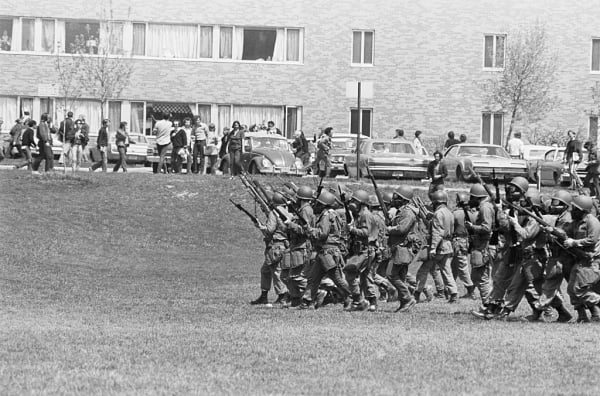
“It seems that we have a broad sense of amnesia of what the National Guard itself is capable of,” said Charles H.F. Davis, an assistant professor of education at the University of Michigan, where he researches structures of domination in U.S. higher education.
Davis said using campus, local and state police to crack down on student protesters is neither new nor surprising, despite the calls for policing reform that arose from the 2020 racial justice protests following the murder of George Floyd.
“It’s a deeply hypocritical set of actions when many institutions have broadly committed to being deliberately anti-racist,” he said. “I think what is interesting about it is the speed with which the escalation has taken place in the face of what are peaceful protests and encampments.”
Kruse sees calls for the National Guard as more of a symbolic message designed to help restore law and order, since campuses and the cities that surround them all have law enforcement agencies of their own.
“But it doesn’t restore order,” he said. “Their campuses are in order right now. What it does is cause chaos.”
When guardsmen have deployed to campuses in the past, it was in response to “genuine disorder,” Kruse said. At Kent State, students smashed store windows and the university’s ROTC building was firebombed before the Ohio governor called in the guard, he said. That’s not the case now.
“As far as I can tell, there’s been no actual threat or no real violence,” he said.
Republican lawmakers, including Johnson and Republican Senators Tom Cotton of Arkansas and Josh Hawley of Missouri, have said the National Guard is needed to protect Jewish students.
After visiting Columbia on Wednesday, Johnson said that if the protests aren’t contained and the threats to Jewish students don’t stop, “there is an appropriate time for the National Guard.”
In a letter requesting that Biden send the National Guard to Morningside Heights, Hawley highlighted the fact that the university canceled in-person classes and that demonstrators had “engaged in shocking displays of antisemitism—assaults on Jewish students, the theft and attempted burning of an Israeli flag, and violent, genocidal rhetoric.”
Either New York Governor Kathy Hochul or President Biden could send the National Guard to campus, though neither has opted to do so yet. White House press secretary Karine Jean-Pierre said Thursday that deploying the guard is something for governors to decide. Hochul said she has no plans to send in the National Guard.
Johnson’s office declined to answer additional questions about what he thinks the National Guard could accomplish that law enforcement can’t. The senators’ offices did not respond to a request for comment. A spokesperson for the National Guard Bureau said that when guard soldiers and airmen are called in, they tend to offer additional resources, such as personnel.
The idea of soldiers descending on a college campus in response to protests might sound far-fetched to some, but in Texas, the National Guard is ready to act if asked. Although the reserve force was not involved in Wednesday’s arrests at UT Austin, the guard was “aware and prepared to respond to the protests,” a Texas MIlitary Department spokesperson said.
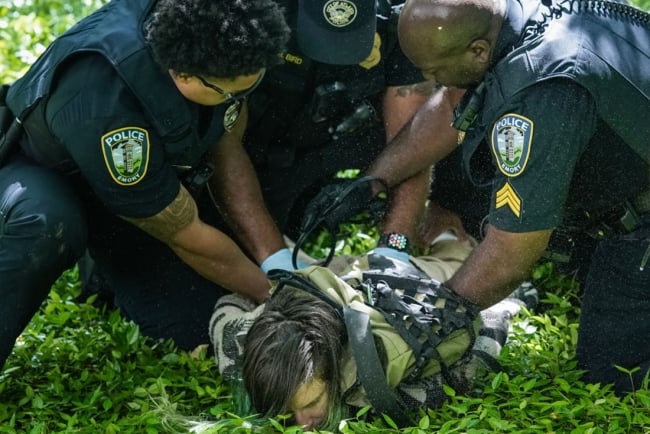
Protesters at Emory University were arrested after being tazed and targeted with rubber bullets. Others on campus reported that police used an irritant gas. Democrats in Georgia condemned the use of “excessive force.”
Photo by ELIJAH NOUVELAGE/AFP via Getty Images
As colleges turn to police to suppress pro-Palestinian demonstrators, some are calling for the National Guard. Experts say history should be a warning.
The University of Phoenix has agreed to pay $4.5 million in a settlement over unlawful recruitment tactics for military students, the California Attorney General’s office announced Thursday.
The settlement concludes a nearly decade-long investigation into the online, for-profit university’s “aggressive” recruitment of veterans who qualified for the Post-9/11 GI Bill between 2012 and 2015. During that period, the university paid over $250,000 to the U.S. military to sponsor 89 recruiting events, including concerts, a fashion show and a chocolate festival, according to the Center for Investigative Reporting.
Those recruitment practices netted the university $1.6 billion dollars in federal education benefits from the Department of Veterans Affairs between 2013 and 2021. That made the University of Phoenix the top recipient of GI Bill funding of any institution in the country in the last decade, despite flouting an executive order from President Obama forbidding such tactics at for-profit institutions. The attorney general’s investigation found that the University of Phoenix also violated California’s False Advertising Law and Unfair Competition Law.
“The University of Phoenix used deceptive and unlawful tactics to convince service members to use their hard-earned education benefits at its own institution, in place of any number of less expensive, high-quality schools,” California Attorney General Rob Bonta said in a statement.
In addition to the $4.5 million fee, the university has to comply with a number of injunctions on recruitment of military veterans, including a prohibition on recruiting agents attending training sessions and orientations for service members and using military seals on its advertising.
University of Kansas faculty members have unionized, in an 850-to-132 vote.
The new United Academics of the University of Kansas (UAKU), affiliated with the American Federation of Teachers (AFT) and the American Association of University Professors, will represent a broad swath of faculty members, the AFT announced Thursday in a news release. That includes full- and part-time, tenured and nontenure-track professors, lecturers, librarians and curators, the AFT said.
Kate DeJarnette, a clinical assistant professor in the university’s speech-language-hearing department, said in the release that “faculty and academic staff are coming together to fight for a better KU, and today, we voted resoundingly to have our voices heard on the critical issues facing our university.” The AFT said faculty members have expressed a need for better wages and job security, along with fixing “unkept classrooms and buildings.”
The release said a month of mail-in voting led up to Thursday’s vote count. The Kansas Department of Labor confirmed the results and the union’s formation to Inside Higher Ed.
In an email, a university spokesperson said “the provost looks forward to working with the new union—and with all faculty, staff and students—on initiatives to advance KU’s mission of education, service and research. We are grateful to the many Lawrence campus faculty who share our goal to make KU the best place it can be.”
Exactly how the rise of generative artificial intelligence will alter higher ed remains unclear, but it’s expected to have far-reaching effects on the ways students learn, professors teach and employers hire. The emergent technology is also bound to have a not-insignificant impact on assessment and testing companies.
One of those companies, the Educational Testing Service, the testing giant that administers the SAT, brought together 200 researchers, employers and educators Thursday for a conversation about “Responsible AI and the Future of Skills” in Washington.
They gathered to discuss growing demand for alternative credentials, the emergence of AI and the technology’s potential to change how people learn and are tested on skills in classrooms and in the workforce.
Amit Sevak, CEO of ETS, opened the event noting that in a recent ETS survey of about 17,000 adults ages 18 and older from 17 different countries, 78 percent of respondents believed that “ongoing skill acquisition,” like earning certificates or licenses, will be as valued as earning a college degree in a decade.
Learners are challenging “the traditional notion that the degree is a sufficient signal for what I can do,” Sevak said. He believes prospective employees are looking for new avenues to demonstrate their competency in skills employers want. Meanwhile, employers care about not just technical skills but also skills such as communication or teamwork.
Sevak and other speakers argued that AI can feed that demand. He believes the technology can create more “personalized” learning and testing experiences and offer students valuable feedback while they learn. Toward that end, the event featured demos of some AI assessment tools developed by ETS, such as HireUp, designed to assess skills employers care about (including “innovative thinking” or “effective communication”) and to identify areas in which students could improve.
The future, Sevak said, lies with assessment “enabled by AI that’s responsible, that’s cutting edge and practical.”
Developing ‘Durable Skills’
Various panels teased out what skills today’s employers want from applicants and what role AI could play in strengthening and assessing those skills.
Lydia Liu, associate vice president of research at ETS, said in a panel on soft or “durable skills” that AI expands the kinds of skills that can be tested. For example, a test of a student’s verbal communication abilities would usually focus on aspects such as grammar and word choice because they’re easier to measure, but communication also has “nonverbal dimensions” that are harder to assess.
“Now with AI, we can look at body language, you can leverage multimodal assessments—we do eye tracking analysis, we analyze facial expressions, we capture gesture, posture,” Liu said. “A lot of the classroom assessments, at least the ones used for summative purposes, do not really allow us to provide that ongoing instant feedback to our learners.”
Libby Rodney, chief strategy officer at The Harris Poll, a market research company, added that because AI can perform many different kinds of technical work, soft skills are going to become increasingly valuable to employers.
“Do you have a workforce that is communicative, that is creative, that is collaborative?” she said. “Those things will become even more important in some cases than technical skills because technical skills will be automated in a 10-year, 20-year timeline.”
The Many Faces of AI
Kara McWilliams, vice president of product innovation and development at ETS, described in a later panel the many ways she believes universities, K-12 schools and employers could harness the power of AI. The technology could be used by college admissions officers to sort through applications, for example, or by employers to screen applicants and tailor professional development opportunities to individual employees based on their needs. She said AI could even predict which students would work well together on a group project for instructors.
But she stressed that these kinds of tools have to be developed and made available equitably.
“I always like to remind myself to come back to the learners, the educators that we’re serving, and they don’t have equitable access to the technologies that they might need to leverage these tools that we have,” she said.
Derrick Anderson, senior vice president of education futures at the American Council on Education, added that he hopes AI can be used to make it easier to give students credit for prior learning as well.
McWilliams doesn’t believe major shifts will happen overnight.
“Systems are difficult to change, especially education,” she said. "I think that it’s about making small moves.”
But employers are ready for change, suggested Johnny C. Taylor, president and CEO of the Society for Human Resource Management, and the day’s last speaker.
What keeps HR professionals “up at night,” he said, is that they can’t find “the right people with the right work ethic and the right skills” to fill positions.
In the meantime, he said, employers have “actually excluded talent” by “using the degree as a proxy for smart.” Degrees are valuable but “can’t be the only way we decide who has talent and who doesn’t.”
He believes AI is soon going to automate work that previously would have been done by college graduates, so “we need to reskill them for jobs of the future.”
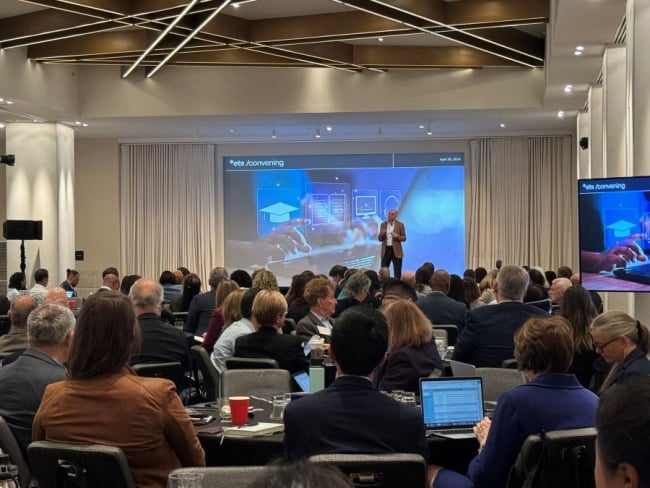
Amit Sevak, CEO of ETS, addresses a crowd in Washington D.C.
Sara Weissman
A gathering hosted by ETS delved into how AI could change how students are tested and how employers assess skills.
The University of Southern California, which has recently come under fire for canceling its valedictorian’s speech and arresting student protesters, announced on Thursday that it is canceling its main commencement ceremony. While it will still host graduations for each school May 8–11, the main stage ceremony, which typically draws a crowd of about 65,000, will not be held.
“We understand that this is disappointing,” the announcement said. “However, we are adding many new activities and celebrations to make this commencement academically meaningful, memorable, and uniquely USC, including places to gather with family, friends, faculty, and staff, the celebratory releasing of the doves, and performances by the Trojan Marching Band.”
The university also announced other safety protocols for commencement events: no one will be able to enter campus without a ticket for a graduation ceremony, and attendees will be subjected to bag searches similar to those required to enter concerts and sporting events.
Each year, D’Youville University, a small, private institution in upstate New York, strives to bring in a commencement speaker to address a topic that’s both timely and relevant to its roughly 500 graduates.
Past topics have run the gamut, including gender equity and the opioid epidemic. This year, the obvious choice was artificial intelligence, said Lorrie Clemo, its president.
“AI seemed to be a clear topic among our student body and senior leadership,” Clemo said. “Then it was, ‘Okay, if we want to feature AI, who’s the best speaker to cover the topic?’ We needed someone to represent AI to make it very visual.”
Enter Sophia, a humanoid robot first launched in 2016 from Houston-based Hansen Robotics. The Buffalo university announced Wednesday it would bring Sophia to speak at its May 11 commencement ceremony.
“With Sophia being a robot and powered by AI, we thought it would be a nice combination,” Clemo said.
Not everyone agreed: A number of students, alumni and Buffalo community members were shocked by the news. When Andrew Fields first saw a fellow D’Youville student post in an Instagram story that the university would feature a robot at commencement, he and his friends assumed it was fake.
“We were sitting on the couch watching T.V., and just started laughing, but then reality began to sink in,” he said. “Students didn’t find out from an email; we found out through news articles.”
Fields, an occupational therapy student graduating next year from D’Youville, joined two nursing students to create a petition on Change.org that night. Fields is a pseudonym for the student, who was concerned about the university’s code of conduct being used against him for filing the petition.
The three students implored university administration to pick a human —“literally anyone, really,” Fields told Inside Higher Ed—instead of Sophia. As of mid-Thursday afternoon, the petition garnered close to 1,100 signatures.
“Our institution is huge with health care professionals, and I just think the emphasis of everything we’ve worked toward is so personal and humanistic,” Fields said. “Health care professionals as a whole have been moving away from a medical model to a more person-centered model and this is just not reflective of the things we’ve learned.”
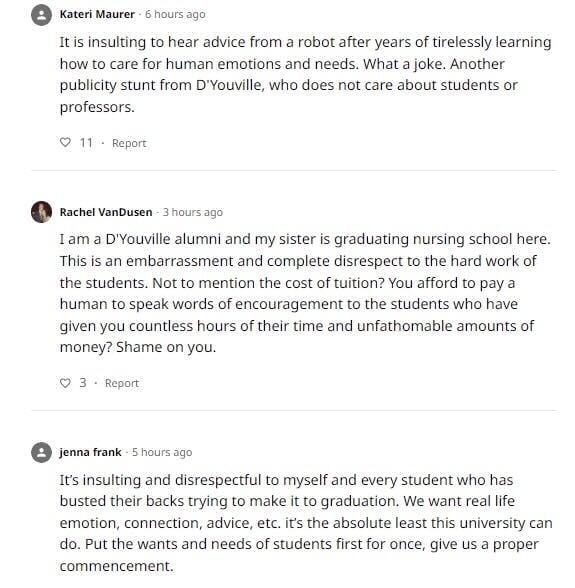
Close to 1,100 students, alumni and community members signed a petition less than 24 hours after D'Youville University announced it would have a robot as its commencement speaker.
Change.org
While Sophia is not giving a commencement speech per se—the AI will be interviewed by the student body president John Rizk—students balked that Rizk is not a graduating senior.
“D’Youville could’ve done something really great with the robot—even a Ted Talk—I just don’t think [commencement] is the time or place for it,” Fields said. “It’s not like students are even hearing from a graduate in their own class.”
Rizk acknowledged that some students are apprehensive about the commencement speaker choice, but said he believes the future-looking focus is perfect timing for graduates.
“I believe this is the right step into the future and it’s a very a time to have students witness a peek into their future, as they close their chapter on university careers and open a new chapter in the future,” he said.
He pointed to the fact Sophia is a citizen of Saudi Arabia, has visited 65 countries and spoken to the United Nations. Rizk was tight-lipped on what his Q&A with Sophia would actually touch on, but said it would be “a great experience and unforgettable.”
“For those that have been to other commencements, people rarely remember who spoke and what they said—this time will be different,” he said.
Clemo added she does not know exactly what Sophia will cover, just that Sophia was prepped with statistics about D’Youville’s students, mission and its focus on health care.
“We’re hoping the robot will talk about how the technology will improve health and wellness in today’s world,” she said.
Once students hear Sophia, Clemo said, she hopes they may change their mind about her.
“They’ll realize maybe the issue isn’t as polarizing as the initial announcement,” she said. “It’s a great opportunity to sort through the opportunities, limitations and what guardrails have to be put in place with new technology.”

D'Youville University has announced a robot will serve as its commencement speaker this year.
Getty Images
D’Youville University thought its selection would be fun and relevant in an age of AI. Not everyone agreed.
The Board of Trustees at Northland College has delayed making a decision on whether to close due to financial issues, citing “several transformative donor gifts” received this week.
“While Northland is still short of its total funding needs, these gifts considerably impact what is possible. In light of this, the Board of Trustees believes the right thing to do is to reconvene with the Faculty Ad Hoc Exigency and Operations and Budget Committees to continue the work of bringing together proposed adjustments and the new budget realities,” Northland College officials said in a statement Tuesday. “This will continue to require a strategic academic re-prioritization and the need for serious decisions, but we are hopeful about the future.”
The university had initially set a goal of $12 million in donations. Officials did not specify the amount of the donations that just came in, or a timeline for making a decision on closure. The gifts arrived the same week that the board intended to provide an update on the college’s future.
The small college in Wisconsin has struggled with enrollment and finances in recent years.
Northland enrolled 518 students in fall 2022, according to the Department of Education’s Integrated Postsecondary Education Data System, and has operated at a loss for much of the last decade, according to the publicly available financial documents for the college. Officials declared financial exigency earlier this month.
Today on the Academic Minute: Abby Chandler, associate professor of history at the University of Massachusetts at Lowell, considers how differently two British colonists in the 1700s reacted to a situation. Learn more about the Academic Minute here.